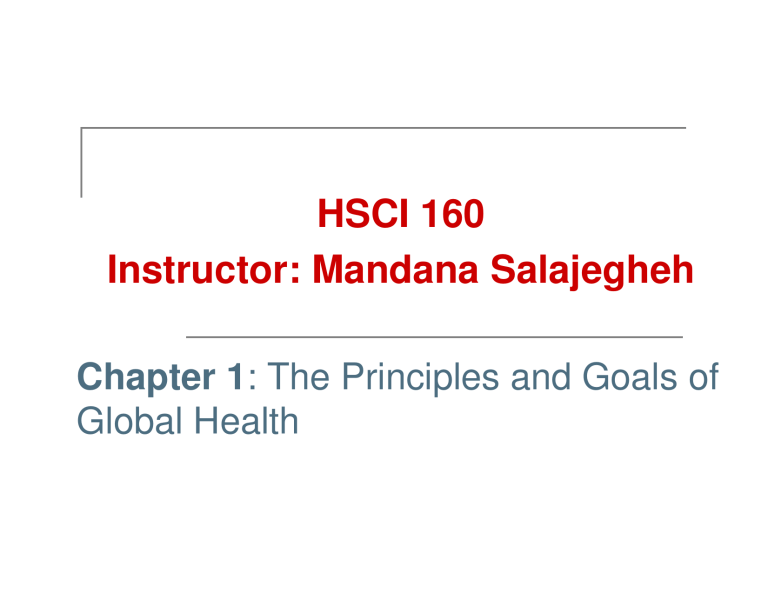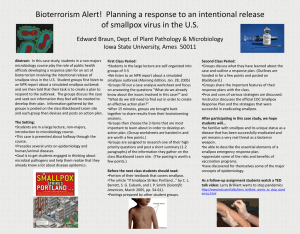
HSCI 160 Instructor: Mandana Salajegheh Chapter 1: The Principles and Goals of Global Health Learning Objectives Define the terms health, public health, and global health Discuss some examples of public health efforts Discuss some examples of global health activities Describe some of the guiding principles of public health work Describe the Millennium Development Goals and Sustainable Development Goals and their relation to global health Briefly discuss the global effort to eradicate smallpox Why should we study Global Health? 2 Why should we study Global Health? www.cartoonstock.com 3 COVID-19 Spread, Dec 3, 2019-Feb 3, 2020 https://cen.acs.org/biological-chemistry/genomics/genomic-epidemiology-tracking-spread-COVID/98/i17 4 COVID-19 Spread, Feb 21-April 21, 2020 https://cen.acs.org/biological-chemistry/genomics/genomic-epidemiology-tracking-spread-COVID/98/i17 5 http://www.dreamstime.com/stock-illustration-map-spread-virus-zika-dates-vector-image664140086 http://www.vox.com/2016/2/2/10893526/zika-virus-disease-spread-history-cases 7 West Nile Virus, Polio and more… * * * 8 Additional Reasons to Study Global Health To understand: The progress that has already been made The challenges that still remain That diseases are not limited by national boundaries That there are disparities among groups The health-development link The need for different actors to work together 9 Definitions Health State of complete physical, mental & social well-being and not merely the absence of disease or infirmity (WHO 1948) The Dimensions of the Health and Wellness Continuum: Health the basics 6th Canadian Edition 10 Definitions Public Health: “…the science and art of preventing disease, prolonging life, and promoting physical health and mental health and efficiency through organized community efforts toward a sanitary environment” —C.E.A. Winslow, 1923 Examples of public health activities? 11 12 Definitions Global Health: “…an area for study, research, and practice that places a priority on improving health and achieving equity in health for all people worldwide.” Examples of global health issues? 13 14 Public Health vs. Medicine 15 A Story Two doctors were walking along the bank of a river when they saw a man drowning. Both of them jumped into the water, pulled him out, administered first-aid, revived him. By the time they were done with him, there came another, followed by yet another. It was becoming really hard to handle so many cases. One of the doctors now decided to set up a clinic at that spot and try to help as many victims as possible. What did the second doctor do? 16 17 Prevention: The Key to Future Health Primary prevention Secondary prevention Tertiary prevention 18 Critical Global Health Concepts & Key health issues The determinants of health Health indicators The importance of culture to health The key risk factors Health care systems Human rights and ethical issues Links between health and education health, equity, poverty, and development Environmental health Nutrition Reproductive health Child health Infectious diseases Non-communicable diseases Injuries 19 Key Terms Developed and developing countries Classification of low-income, middle-income, and high-income countries (GNI/Capita) <$1,025...$3,995…$12,376< World Bank, WHO & OECD (Organisation for Economic Co-operation and Development) Human Development Index 20 Human Development Index [0-1] http://hdr.undp.org/en/statistics/hdi/ 21 22 Organization of Data by World Bank 23 WHO Regions 24 Key Terms The United Nations Development Programme (UNDP) is the UN’s global development network, advocating for change and connecting countries to knowledge, experience and resources to help people build a better life. The Millennium Development Goals (MDGs) In 2000, 189 nations made a promise to free people from extreme poverty and multiple deprivations. This pledge became the eight Millennium Development Goals to be achieved by 2015. In September 2010, the world recommitted itself to accelerate progress towards these goals. 25 Millennium Development Goals www.gavi.org 26 How much progress has been made? The Millennium Development Goals report 2015 (United Nations) 27 How much progress has been made? 28 The Sustainable Development Goals The Sustainable Development Goals (SDGs), otherwise known as the Global Goals, are a universal call to action to end poverty, protect the planet and ensure that all people enjoy peace and prosperity. These 17 Goals build on the successes of the MDGs while including new areas such as climate change, economic inequality, innovation, sustainable consumption, peace and justice, among other priorities. The goals are interconnected – often the key to success on one will involve tackling issues more commonly associated with another. 29 30 Selected Central Messages of the Book Health, human development, labor productivity and economic development are linked There are a variety of health determinants including genetic make-up,sex, social status, income, education, knowledge of health behaviors Great progress in health in the last 50 years, but progress has been uneven and large gaps remain There are enormous disparities in health Countries can achieve high levels of health, even without high levels of income Cooperation is needed to solve some global health problems Yet .. An important part of health status depends on individuals, families, and communities The health of each of us is linked to the health of all of us 31 Smallpox eradication: The most famous success story 32 Smallpox eradication: The most famous success story Acute contagious disease caused by variola virus In 1966, affected 10-15 million people, killed 30% of affected people! deep scars & blindness WHO proposal and the US technical & financial support (1959-1966) All Who members manage program funds effectively Report all cases Encourage research on smallpox Maintain flexibility in implementation of the program to suit local needs In 1980, WHO declared smallpox the 1st eradicated disease in history 33 Smallpox eradication: The most famous success story Watch Video (Rx for survival) https://www.youtube.com/watch?v=ULKJjX16t3M Prepare to have a discussion after the video Pay attention and write down what were the important factors that helped the smallpox eradication campaign to succeed and become the “greatest public health accomplishment” up to date? What would be the key “take home message/s” from this example for you? 34 Smallpox eradication: The most famous success story Vaccine is available and easy to administer Volunteers and devoted individuals – warriors Disease characteristics - human-to-human transmission, easy to recognize Reaching out remote communities Ring vaccination and “herd immunity” Existing networks - missionaries Strategies in India and Nigeria House to house campaign, Goddess, villagers and etc. 35 Lessons learned Political commitment and leadership Having someone in each country, solely responsible for eradication effort Small WHO teams frequent field trips to review program Small number of committed people motivated large number of staffs Monthly meetings to exchange information about the progress Many countries forced to improve their health system Can vaccinate people with more than one vaccine at a time 36 Chapter Review Questions 1) 2) 3) 4) How does the World Health Organization define “health” Briefly define “public health” Give three examples of public health activities What are three key differences between the “public health approach “and the “medical approach”? 5) What is “global health”? 6) Name three examples of key global health activities 7) What are the Millennium Development Goals? 8) What are the Sustainable Development Goals? 9) What are three low-income countries? 10) What are three high-income countries? 11) What is the Human Development Index? 12) What were two of the keys to the eradication of smallpox? 37

